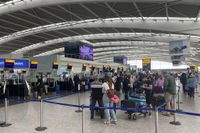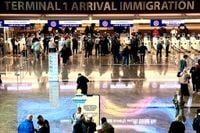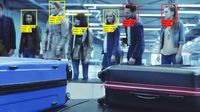The aviation industry is on the brink of a major transformation as the International Civil Aviation Organisation (ICAO) announces plans to eliminate traditional check-in and boarding passes within the next two to three years. This groundbreaking change, described as the most significant overhaul in 50 years, will allow passengers to upload their passport information to their smartphones and pass through airports using facial recognition technology.
According to the ICAO, the new system will introduce a "digital travel credential" that enables travelers to store and verify their passport details on their mobile devices. This means that the cumbersome process of checking in and presenting physical boarding passes will soon be a thing of the past.
Currently, passengers must either check in online or at the airport, where they receive a boarding pass that is scanned at various checkpoints, including the gate before boarding. However, the proposed changes aim to streamline this experience significantly. Instead, passengers will be able to download a "journey pass" when they book their flights, which will update automatically if there are any changes to their itinerary.
At the airport, once travelers arrive, their faces will be scanned, alerting airlines of their intention to fly. For those with hold luggage, this verification will occur at bag-drop points, while passengers traveling with hand luggage will be verified at pre-security gates. This new process is expected to drastically reduce the time spent at airports, making travel more efficient.
Valérie Viale, the director of product management at Amadeus, the world's largest travel technology company, emphasized the importance of this transition. She stated, "These changes are the biggest in 50 years. Many airline systems haven't changed for more than 50 years because everything has to be consistent across the industry and interoperable. The last upgrade of great scale was the adoption of e-ticketing in the early 2000s. The industry has now decided it's time to upgrade to modern systems that are more like what Amazon would use."
Viale's remarks highlight a growing trend in the aviation sector to adopt advanced digital technologies that simplify the travel experience. The implementation of facial recognition technology will require substantial upgrades to airport infrastructure, including systems capable of reading passport data directly from smartphones. Importantly, the proposed systems will only verify information—matching faces to passports—without storing personal data, thus minimizing the risk of data breaches.
Amadeus has also developed a system that ensures passengers' details are deleted within 15 seconds of each contact with a touchpoint, such as pre-security gates. This feature aims to address privacy concerns that may arise from the use of biometric data.
Furthermore, the new technology could revolutionize how delays and connecting flights are handled. Passengers who miss their connections due to unforeseen delays could receive automatic notifications on their phones with details of their new onward flights. Their journey pass would update seamlessly, allowing them to board the new flight without the need for additional check-in procedures.
While the ICAO's plans are ambitious, they are not without precedent. Some airports worldwide have already begun implementing similar technologies. For instance, Singapore's airport has kiosks that expedite passport control using facial recognition, while many airports in Australia are adopting comparable systems.
In addition to streamlining security checks, airlines are exploring the inclusion of location services within the digital journey bundle. Major carriers such as British Airways, Air France-KLM, Finnair, and Saudia Airlines are evaluating this feature, which would provide passengers with real-time directions to their departure gates. This could further enhance the travel experience, ensuring that travelers navigate airports with ease.
However, the transition to a fully digital travel experience raises questions about privacy and technology reliability. Past incidents, such as the global chaos caused by a Microsoft outage in July 2024, serve as a reminder of the potential pitfalls of over-reliance on technology. During that event, flights were grounded, and passengers were left stranded as airport systems failed due to a faulty update.
Despite these challenges, the aviation industry appears committed to embracing digital transformation. The ICAO's initiative reflects a broader trend toward modernization, with airports and airlines recognizing the need to adapt to the expectations of today's tech-savvy travelers.
As the timeline for these changes approaches, the aviation sector will need to navigate the complexities of implementing new technologies while ensuring that privacy and security remain top priorities. The success of this overhaul will depend on collaboration among airlines, airports, and technology providers to create a seamless and secure travel experience.
In the coming years, travelers can expect a more efficient, streamlined airport experience, where facial recognition and digital credentials replace traditional check-in procedures. As the industry moves toward this new era, the future of air travel looks promising, with the potential for significant improvements in convenience and efficiency.







